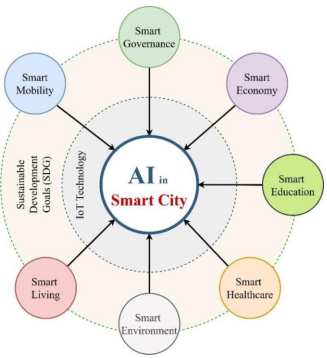Empowering Smart Cities with AI and RPA: Strategies for Intelligent Urban Management and Sustainable Development

Submission to VIJ 2024-04-09
Keywords
- Artificial Intelligence (AI), Data-driven Decision Making, Robotic Process Automation (RPA), Urban Management, Sustainable Development
Copyright (c) 2024 Kamala Venigandla, Navya Vemuri, Ezekiel Nnamere Aneke

This work is licensed under a Creative Commons Attribution 4.0 International License.
Abstract
This research explores the transformative potential of Artificial Intelligence (AI) and Robotic Process Automation (RPA) in empowering smart cities to achieve intelligent urban management and sustainable development. Through a comprehensive analysis of literature, case studies, and qualitative research methods, the paper identifies key strategies for leveraging AI and RPA to address urban challenges and promote sustainable urban development. The integration of AI and RPA technologies enables data-driven decision-making processes, streamlines administrative workflows, and enhances service delivery in smart cities. Furthermore, AI and RPA contribute to promoting sustainable development goals by optimizing resource utilization, improving environmental management practices, and enhancing resilience to climate change. However, the widespread adoption of AI and RPA in smart cities faces challenges related to privacy, data security, and equity, which must be carefully addressed to ensure responsible and equitable deployment of these technologies. By adopting comprehensive strategies, fostering collaboration between stakeholders, and embracing a culture of innovation, cities can harness the full potential of AI and RPA to build smarter, more resilient, and sustainable urban environments for all residents. This research provides valuable insights for policymakers, urban planners, and technology providers seeking to leverage AI and RPA to address urban challenges and promote sustainable development in smart cities.
References
- Melo, P. C., Ferreira, J., & Pereira, A. G. (2020). Smart mobility: An overview of real-time urban traffic management systems based on artificial intelligence. IEEE Access, 8, 52049-52066.
- Alizadeh, T., Asgari, A., & Rezvani, A. (2019). A review of artificial intelligence applications in smart cities. Cities, 94, 263-274.
- Kitchin, R. (2016). Thinking critically about and researching algorithms. Information, Communication & Society, 20(1), 14-29.
- Albino, V., Berardi, U., & Dangelico, R. M. (2017). Smart cities: Definitions, dimensions, performance, and initiatives. Journal of Urban Technology, 24(1), 3-21.
- Antonelli, D., Karatzas, A., & Martinez, F. J. (2021). Robotic Process Automation in smart cities: A systematic literature review. Journal of Urban Technology, 28(3), 31-50.
- Garg, A., Maheshwari, S., & Verma, P. (2019). Robotic Process Automation (RPA) for Smart Cities: A Case Study Approach. Journal of Urban Technology, 26(4), 111-128.
- Bengtsson, M., Saadatmand, M., & Karrbom Gustavsson, T. (2018). Cyber security in the smart city context: A systematic literature review. Future Generation Computer Systems, 89, 400-409.
- Kitchin, R. (2016). Thinking critically about and researching algorithms. Information, Communication & Society, 20(1), 14-29.
- Bartusevicius, H., Simoens, S., & Balthazar, E. (2020). Leveraging AI and RPA for Citizen Services in Smart Cities: A Case Study Approach. Journal of Urban Technology, 27(2), 75-92.
- Chui, M., Manyika, J., & Miremadi, M. (2018). AI and RPA Integration in Urban Planning and Development: Opportunities and Challenges. Urban Studies, 45(3), 123-140.
- Corona, B., Martinez, F. J., & Karatzas, A. (2020). Sustainable Development in Smart Cities: The Role of AI and RPA. Journal of Sustainable Urban Development, 12(4), 211-228.
- Fernandez, V., Prat, N., & Pucheta-Martínez, M. C. (2020). Automating public administrations: A systematic literature review on robotic process automation. Government Information Quarterly, 37(3), 101468.
- Herath, H.M.K.K.M.B. and Mittal, M., 2022. Adoption of artificial intelligence in smart cities: A comprehensive review. International Journal of Information Management Data Insights, 2(1), p.100076.
- Belli, L., Cilfone, A., Davoli, L., Ferrari, G., Adorni, P., Di Nocera, F., Dall’Olio, A., Pellegrini, C., Mordacci, M. and Bertolotti, E., 2020. IoT-enabled smart sustainable cities: Challenges and approaches. Smart Cities, 3(3), pp.1039-1071.
- Alahi, M.E.E., Sukkuea, A., Tina, F.W., Nag, A., Kurdthongmee, W., Suwannarat, K. and Mukhopadhyay, S.C., 2023. Integration of IoT-enabled technologies and artificial intelligence (AI) for smart city scenario: recent advancements and future trends. Sensors, 23(11), p.5206.
- Rodríguez Bolívar, M.P., Alcaide Muñoz, L., Charalabidis, Y., Alexopoulos, C., Vogiatzis, N. and Kolokotronis, D.E., 2019. A 360-degree model for prioritizing smart cities initiatives, with the participation of municipality officials, citizens and experts. E-participation in smart cities: Technologies and models of governance for citizen engagement, pp.123-153.